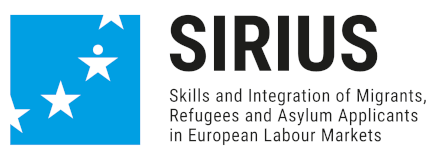Policy Briefs
POLICY BRIEF N.6 SEPTEMBER 2020
SIRIUS Consortium
The main purpose of WP6 which is the research work underpinning this policy brief was to understand nuances and dynamics of labour market integration (LMI) from the insider (Migrants, Refugees and Asylum Seekers--MRAs’) perspective. It had the three following objectives: to analyse MRAs’ insights into barriers and enablers of LMI; to analyse the difference/similarity between the official knowledge about LMI and the MRAs’ experiences on the ground; and to create a comprehensive narrative of LMI that would present the findings to wider, non-academic audiences.
The policy brief presents findings from a four-month long process of field work of interviews with migrants, refugees, and asylum seekers. We have conducted 100 semi structured narrative-biographic interviews with post-2014 migrants, refugees and asylum seekers in 7 countries, namely: 16 interviews in Greece; 10 in Italy; 11 in Switzerland, Finland and the UK each; 14 in the Czech Republic; and 27 in Denmark.
Attachments![]() Sixth Policy Brief
Sixth Policy Brief![]() One Page Sixth Policy Brief
One Page Sixth Policy Brief
POLICY BRIEF N. 5 - MARCH 2020
SIRIUS Consortium
Social partners play a key role in labour market dynamics as they contribute towards determining the policy and legal frameworks that shape labour markets, but also the social, political and economic trends in which labour markets are embedded. Therefore, an examination of social partners’ understanding of the newcomers’ capacities and their appreciation of opportunities and challenges to be addressed is unavoidable in any research willing to understand how to facilitate unlocking the employment potential of third country nationals, being these migrants, refugees or asylum applicants (MRAs—please note that SIRIUS only focuses on non-EU migrants).
Therefore, in this policy brief we present evidence and policy considerations about the role social partners and social dialogue play in labour market integration of migrants, refugees and asylum seekers, with the aim to present the views of trade unions and employers representatives concerning barriers or enablers of post-2014 MRAs integration in European labour markets across the seven countries studied in SIRIUS (Czech Republic, Denmark, Finland, Greece, Italy, Switzerland and the United Kingdom). We focus on post-2014 MRAs given the peak in migration and asylum figures Europe has experienced in 2015 and 2016 and the limited research-based evidence about them.
Attachments![]() Fifth Policy Brief
Fifth Policy Brief![]() One Page Fifth Policy Brief
One Page Fifth Policy Brief
POLICY BRIEF N. 4 - NOVEMBER 2019
SIRIUS Consortium
Civil society organizations (CSOs) play a crucial role in the implementation of labour market integration policies and services. The importance of CSOs, following the so-called migration crisis, has even increased since 2014 as the public sector struggled to satisfy the increased demand for labour market integration services. The post-2014 era contributed to a higher diversification of civil society organisations and to the emergence of transnational solidarity movements operating independently of the institutionalised systems of integration, national funding, and transnational intergovernmental organisations. The support of CSOs is often vital as regards the assistance provided to refugees and asylum seekers.
Against this backdrop, the aim of this policy brief is to understand both the demand and supply expected from and provided by CSOs in the area of labour market integration services. In other words, the SIRIUS project focused not only on how CSOs react to the needs of MRAs but also on what MRAs expect and receive from them.
Therefore, in this policy brief we present evidence and policy considerations about the role CSOs play in labour market integration of migrants, refugees and asylum seekers (MRAs), with the aim to present the key areas of labour market integration initiatives, following an overview of social processes and mechanisms that operate as barriers or enablers of post-2014 MRAs integration in European labour markets across the seven countries studied in SIRIUS (the Czech Republic, Denmark, Finland, Greece, Italy, Switzerland, and the United Kingdom). We focus on post-2014 MRAs given the peak in migration and asylum figures Europe has experienced in 2015 and 2016.
Attachments![]() Fourth Policy Brief
Fourth Policy Brief![]() One Page Fourth Policy Brief
One Page Fourth Policy Brief
POLICY BRIEF N. 3 - MAY 2019
SIRIUS Consortium
Migrants, asylum seekers and refugees (MRAs) tend, for a variety of reasons, to be less successful in host country labour markets than natives. To reduce this gap, governments have put in place specific policies. The objectives of these migrant labour market integration (MLI) policies are 1) helping migrants to overcome handicaps and skill deficits to better succeed in host country labour markets 2) better matching migrants’ characteristics to employer needs by, for example, training them or guiding them to labour shortage occupations. These policies tend to focus on giving migrants appropriate skills for the local job market (notably, language skills, but others as well), and sometimes providing work experience and job matching services. Labour market integration policies for migrants are also usually centred around various active labour market policies (ALMPs), and integration training programmes.
The main barriers to labour market integration of migrants are similar across our sample of European countries (Denmark, Czech Republic, Finland, Greece, Italy, Switzerland and UK), and include lack of language skills, ineffective administrative and legal structures, lack of recognition of (home country) skills and qualifications, lack of needed skills and competencies, lack of networks, discrimination, exploitation, a general atmosphere of xenophobia in society and (perceived) cultural barriers.
In this policy brief, we present evidence and policy considerations about MLI programmes, expanding the eligibility to partake in these programmes, the recognition of prior education and experiences and the effectiveness of individualised integration plans.
Attachments![]() Third Policy Brief
Third Policy Brief![]() One Page Third Policy Brief
One Page Third Policy Brief
POLICY BRIEF N. 2 - JANUARY 2019
SIRIUS Consortium
This report details the findings of the fourth SIRIUS work package, focusing on the role of civil society organisations (CSOs) in the labour market integration (LMI) of MRAs. Our report examines the positions of CSOs and their perception by MRAs in the SIRIUS partner countries, namely the Czech Republic, Denmark, Greece, Finland, Italy, Switzerland, and the United Kingdom, and thus our findings reflect experiences across a wide variety of different national contexts. Our findings suggest that CSOs can work as important actors enhancing not only integration into the labour market but also integration through the labour market. CSOs are important language course providers, and thanks to their social, legal, and administrative guidance, CSOs help MRAs in overcoming ineffective administrative and legal structures. These activities are provided by the majority of CSOs across SIRIUS countries. Several CSOs in these countries also assist MRAs with the recruitment process, providing courses and advice on how to prepare for an interview, how to write a CV, or how to draft a cover letter. Furthermore, CSOs also assist MRAs in their efforts to have their skills and qualifications recognised. Moreover, by providing mentorship, training programmes, volunteering, or even direct employment, CSOs contribute to the development of MRAs’ skills and competencies and provide platforms to enhance the agency and autonomy of MRAs. However, such a capacity is unevenly spatially distributed, it is rather rare in the Czech Republic and Denmark, it is somewhat developed in the United Kingdom, and more strongly developed in Finland, some areas of Italy, among the solidarity movement organisations of Greece, and in the Canton of Geneva in Switzerland. Moreover, CSOs either individually or collectively, frequently raise the problematic situation of illegal practices on the part of employers, exploitation, human trafficking, or underpaid wages. Last but not the least, CSOs help to mitigate and, often together with MRAs, struggle against the hostile context of a widespread atmosphere of xenophobia.
Attachments![]() Second Policy Brief
Second Policy Brief![]() One Page Second Policy Brief
One Page Second Policy Brief
POLICY BRIEF N. 1 - AUGUST 2018
SIRIUS Consortium
The capacity for labour market opportunities to ensure the economic and social ‘inclusion’ of people within society holds true for host populations as well as migrants, refugees and asylum seekers (MRAs). Regardless of one’s migrant or native status (by native we mean people residing in their country of birth and nationality), employment provides income, social identity, social connections, and it enables individuals to contribute to the growth and prosperity of the country through consumption and taxation. However, the integration of MRAs via labour markets is not a straightforward task, due to the specific issues relating to migration and refugee/asylum statuses, but also due to the extent of heterogeneity apparent across contemporary labour markets in Europe. This heterogeneity (in economic structure, sectorial composition, labour force and demographic features, etc.), combined with the substantial, but also uneven, impact of the wider economic crisis on European labour markets, has created a highly differentiated economic and social environment across countries. Building on such premises, SIRIUS understands the labour market integration of migrants, asylum seekers and refugees as being dependent on a pattern of concurring circumstances and features located at different analytical levels: at the macro (state, sub-state and supra-state), at the meso (intra-societal), and at the micro (individual) levels.
In this policy brief we present evidence and policy considerations about the ‘macro’ dimensions of integration by scrutinizing the characteristics of post-2014 MRAs along with the economic drivers of the SIRIUS economies (the Czech Republic, Denmark, Finland, Greece, Italy, the United Kingdom and Switzerland) and their labour markets determinants.
Attachments![]() First Policy Brief
First Policy Brief![]() One Page First Policy Brief
One Page First Policy Brief


